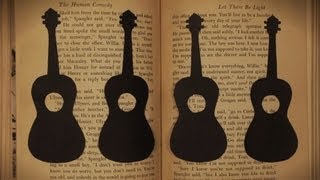(单词翻译:单击)
Mysteries of vernacular: Ukulele, a small, four-stringed guitar.
通用俗语的谜团:尤克里里,是指一种小巧的四弦吉他。
Oddly enough, the word ukulele, in its native Hawaiian, literally translates to jumping flea.
奇怪的是,“尤克里里”这个词在夏威夷语中的直译是“跳跃的跳蚤”。
Even more surprising, the instrument itself did not originate in Hawaii.
更惊奇的是,这种乐器本身并非源自夏威夷。
So, how did a Hawaiian word come to describe a non-Hawaiian instrument?
那么,一个夏威夷词语怎么会用来形容一种非夏威夷的乐器呢?
Back in the late 1800s, King Kalākaua was the last reigning king of the kingdom of Hawaii.
19世纪末,卡拉卡瓦国王是最后一位夏威夷王国的统治者。
He was nicknamed 'The Merry Monarch' because of his joy for life and, in particular, his love of music.
被称为“快乐的国王”,这是因为他对生活的热爱以及对音乐尤其的热衷。
In the King's court, there was a former British army officer named Edward Purvis.
在他的王宫中,有一名名叫爱德华·珀维斯的前英国军官。

Though a small man, he was quite lively, and his nickname was 'Jumping Flea,' 'Ukulele' in Hawaiian.
尽管身材矮小,可他却十分活跃,因此他被冠以“跳跃的跳蚤”这一绰号,在夏威夷语里就是“尤克里里”。
Like the King, he was a great lover of music.
同国王一样,他也十分热爱音乐。
In 1879, a group of Portuguese immigrants arrived on the islands of Hawaii,
1879年,一群葡萄牙移民来到了夏威夷群岛,
bringing with them a small, four-stringed guitar known as a braguinha.
他们带着一种名叫braguinha的小巧的四弦吉他。
Purvis was immediately taken with the instrument and helped spread its popularity throughout the King's court.
珀维斯顿时被其所吸引,并使这种乐器在王宫里流行起来。
As the story goes, it was not long before his nickname, Ukulele, jumped from the man to his favorite instrument.
据说,不久之后,“尤克里里”便从他的绰号变为了他最喜爱乐器的名称。
As demand grew, several Portuguese families began to manufacture the minuscule guitar on the islands,
随着需求的增长,一些葡萄牙家庭开始在岛上生产这种小型的吉他,
making small modifications until it became the same ukulele we recognize today.
经过细微的改进,它便成为了今天我们所熟知的尤克里里。


